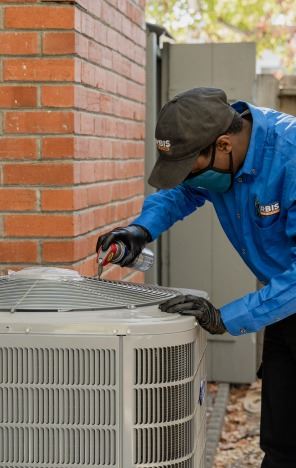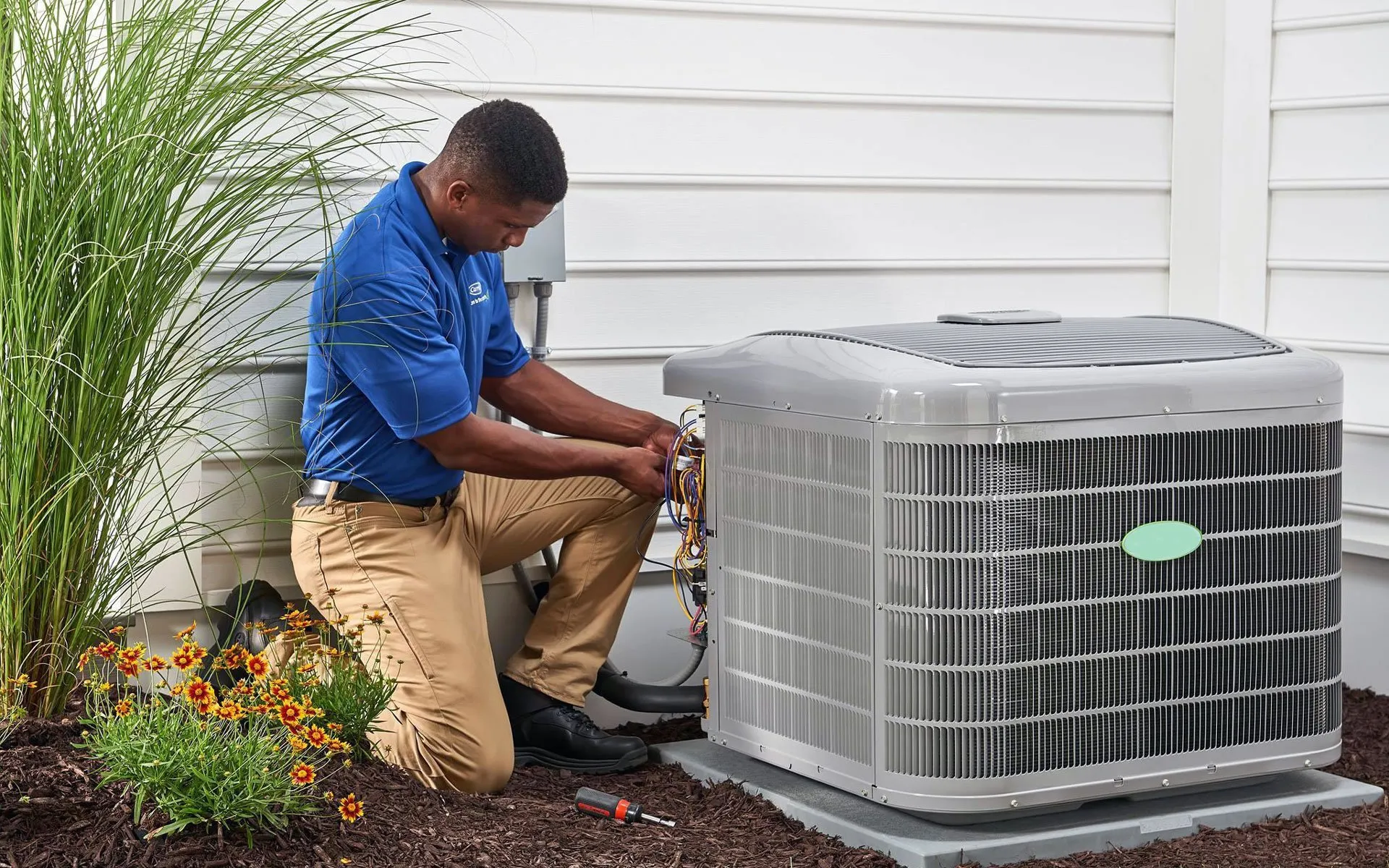Signs of a Quality heat pump installation ooltewah tn
Signs of a Quality heat pump installation ooltewah tn
Blog Article
Picking Between a Warmth Pump and Heater: Secret Considerations for Your Cooling And Heating Requirements
When reviewing home heating options for HVAC requires, the decision in between a heatpump and a heater can be intricate. Each system offers distinctive advantages customized to certain climates and power performance goals. Understanding these differences is necessary for making an enlightened choice. Key aspects such as installation prices and ecological effect further make complex the option process. Which alternative really aligns with one's convenience and sustainability choices? The following areas will check out these factors to consider thoroughly.
Recognizing Warmth Pumps: How They Function and Their Advantages
While lots of home owners take into consideration various home heating options, understanding exactly how warmth pumps feature and their advantages can substantially affect their choice. Heat pumps run by transferring heat instead of producing it. In the wintertime, they extract warm from the outside air or ground and move it inside, while in the summer, they reverse this procedure, cooling the home by eliminating heat outside. This dual capability makes them versatile for year-round environment control.One of the primary advantages of heatpump is their energy effectiveness. They utilize considerably much less electrical power compared to standard heater, possibly causing lower utility costs (heat pump replacement ooltewah tn). Furthermore, heatpump have a smaller carbon footprint, making them an ecologically friendly selection. They also call for much less maintenance than conventional systems, contributing to lasting cost financial savings. Overall, understanding the mechanics and advantages of heatpump can aid house owners make educated decisions concerning their home heating and cooling demands
Checking Out Heating Systems: Kinds, Operation, and Benefits
Heaters come in various types, consisting of gas, electric, and oil designs, each with distinct operational mechanisms. Comprehending these differences is crucial, as they impact efficiency and heating performance. Furthermore, heaters supply many benefits, such as consistent warmth result and reliability in chillier climates.
Kinds of Furnaces
Heating unit can vary substantially in layout and procedure, with heaters being a prominent selection amongst house owners. There are numerous kinds of heaters, each using various gas resources and modern technologies. Gas heaters are usual, leveraging all-natural gas to create warm successfully. Electric heating systems, on the various other hand, utilize electrical resistance to create heat, usually preferred for their uncomplicated setup. Oil heaters, while less common, work in locations with restricted gas access (heat pump service). In addition, condensing furnaces maximize energy efficiency by recycling and capturing exhaust gases. Each type operates via a system of warmth exchangers and ductwork to distribute cozy air throughout a home. Understanding the differences between these heater kinds is crucial for informed HVAC choices
Benefits of Furnaces
For house owners looking for reputable heat during cool months, the benefits of heating systems are considerable. Furnaces supply constant home heating, making certain also temperatures throughout the home. They are specifically efficient in severe cool, typically outmatching heat pumps in frigid conditions. Different kinds, including gas, electric, and oil heaters, provide flexibility to fulfill varied requirements and preferences.Furnaces additionally have a tendency to have reduced initial installation costs compared to warmth pumps, making them an extra available option for numerous. Their durable style contributes to a much longer life-span, with several units lasting over 15 years with correct maintenance. Furthermore, contemporary furnaces are frequently geared up with advanced technology for improved performance, which can bring about reduced energy costs. Generally, heating systems continue to be a dependable option for efficient home heating.

Power Effectiveness: Comparing Warmth Pumps and Furnaces
When contrasting power effectiveness in between heatpump and heating systems, the Seasonal Energy Performance Proportion (SEER) plays a vital function in determining performance. Additionally, a functional expense analysis discloses the long-term financial implications of each system. Understanding these elements can guide home owners in making educated decisions concerning their home heating remedies.
Seasonal Energy Performance Proportion
Power performance plays a vital role in the decision-making procedure between warm pumps and heating systems, specifically when considering the Seasonal Energy Efficiency Proportion (SEER) This statistics procedures the cooling performance of heatpump over a whole cooling period, giving a standardized way to assess performance. Greater SEER scores suggest higher energy performance, equating to reduced energy usage and minimized utility expenses. On the other hand, heaters are normally evaluated making use of the Yearly Fuel Usage Effectiveness (AFUE) rating, which reflects heating performance. When contrasting these 2 systems, home owners should focus on SEER rankings for heatpump, as they directly effect total energy cost savings and ecological sustainability. An extensive understanding of SEER can notably affect the lasting satisfaction and cost-effectiveness of the picked HVAC remedy.
Operational Cost Analysis
Recognizing the operational expenses related to warm pumps and heating systems is essential for house owners evaluating their choices. Heat pumps normally supply greater power effectiveness, converting electrical energy right into warmth with very little waste. This leads to reduced month-to-month energy expenses, especially in modest environments. Conversely, traditional heating systems, especially gas models, might have lower upfront prices however can sustain greater functional costs gradually because of sustain prices and efficiency ratings.Moreover, heatpump can function as both home heating and cooling down systems, potentially reducing the requirement for separate cooling and heating units. While initial investments for warm pumps may be greater, their lasting financial savings in power efficiency can make them a more affordable option for numerous families. Careful evaluation of regional energy rates is important to determine the most effective choice.
Installation Expenses: What to Expect for every Heating Unit
Installment expenses for heater can vary considerably between heatpump and link heaters, influencing house owners' decisions. Heatpump usually have higher in advance setup expenses, normally ranging from $3,500 to $8,000, relying on the system dimension and intricacy of installation. This consists of the outside system, interior handling system, and needed ductwork adjustments. Conversely, heaters have a tendency to have lower first prices, balancing between $2,500 and $6,000, which can be appealing for budget-conscious property owners. Installation expenses can enhance if substantial ductwork is required.Moreover, the selection of gas kind for heating systems-- all-natural gas, gas, or electrical-- can also influence installation prices. While warm pumps provide energy efficiency, their initial financial investment may deter some purchasers. Inevitably, assessing setup prices together with lasting financial savings and efficiency will aid home owners in making educated decisions regarding their heating unit.
Climate Factors To Consider: Which System Executes Better in Your Location
Exactly how do environment conditions affect the effectiveness of home heating systems? The performance of warmth pumps and heating systems can differ substantially depending on the regional climate. In moderate environments, heatpump excel by efficiently transferring warm from the outdoors air, making them an energy-saving alternative. Nevertheless, their efficiency reduces in extremely chilly temperatures, where they may battle to extract enough warmth. Alternatively, heaters, specifically gas designs, offer constant and trustworthy warmth no matter outdoor conditions, making why not try here them more suitable in chillier regions.In locations that experience milder winter seasons, warmth pumps can run properly year-round, supplying both heating and cooling. In comparison, areas with rough winters months frequently take advantage of the robustness of heating systems. Inevitably, recognizing the neighborhood environment is vital when deciding between a heatpump and a heating system, as it directly impacts their operational performance and general performance.
Upkeep Needs: Long-Term Treatment for Warmth Pumps vs. Furnaces
While both warmth pumps and heaters need routine upkeep to assure peak performance, their particular needs and care regimens vary considerably. Heating systems typically need much less frequent attention, with yearly assessments sufficing to examine for gas leakages, tidy filters, and analyze total capability. Their simpler layout frequently permits straightforward repairs.In comparison, heat pumps demand biannual upkeep due to their dual function in home heating and cooling. This includes cleansing coils, checking refrigerant levels, and making sure that both the indoor and outside systems work at their best. In addition, warmth pump maintenance commonly involves even more intricate elements, making expert maintenance essential.Neglecting maintenance can result in decreased effectiveness and enhanced energy prices for both systems. Ultimately, house owners must think about these long-term care needs when choosing in between a heatpump and a heating system, as positive maintenance can extend the life expectancy and efficiency of either system significantly.
Ecological Impact: Picking a Sustainable Home Heating Option
The environmental impact of heater is an important analysis for property owners looking for sustainable choices. Heat pumps are generally more energy-efficient than typical furnaces, as they transfer warmth as opposed to generate it, significantly reducing carbon exhausts. By making use of renewable resource sources, such as geothermal or air-source heatpump, property owners can additionally reduce their environmental footprint.On the other hand, natural gas heaters produce greenhouse gases and add to air pollution, though they typically provide greater heat outcome. Nevertheless, improvements in innovation have led to the growth of high-efficiency heaters that reduce emissions.Ultimately, choosing a heating system includes evaluating effectiveness against ecological impact. House owners are urged to review neighborhood power sources and incentives for sustainable systems, making certain an option that straightens with both personal comfort and ecological responsibility. The choice influences not only prompt comfort but additionally long-lasting sustainability and environmental health and wellness.
Frequently Asked Questions
For How Long Do Heat Pumps and Furnaces Normally Last?
The life-span of heat pumps normally ranges from 15 to 20 years, while furnaces can last between 15 to thirty years. Regular maintenance substantially impacts their long life and effectiveness in providing heating remedies.
Can I Utilize a Warmth Pump in Very Cold Climates?
Warmth pumps can run in extremely chilly environments, however their efficiency decreases as temperature levels drop. In such problems, supplemental home heating sources might be necessary to go to this site maintain comfy interior temperatures and ensure peak performance.

What Is the Sound Level of Warmth Pumps Versus Furnaces?
The noise degrees of heatpump and heating systems vary considerably. Typically, heat pumps run even more quietly than conventional heating systems, making them more effective for those sensitive to sound, while heaters might create louder operational noises throughout home heating cycles.
Are Warmth Pumps Suitable for Both Heating & Cooling?
Heatpump are undoubtedly appropriate for both heating & cooling (furnace replacement). They operate by moving heat, giving reliable temperature level control year-round, making them a functional selection for home owners looking for an all-in-one a/c service
What Dimension Furnace Do I Need for My Home?
Figuring out the ideal size furnace for a home requires examining elements such as square video, insulation high quality, local environment, and the home's design. Consulting a professional can ensure an exact evaluation and ideal convenience. Warm pumps typically offer higher power effectiveness, converting electric power into warm with minimal waste. In modest environments, warm pumps stand out by effectively moving heat from the outside air, making them an energy-saving option. Alternatively, furnaces, particularly gas designs, offer constant and trusted warmth regardless of exterior conditions, making them more suitable in colder regions.In areas that experience milder winters, heat pumps can run successfully year-round, offering both heating and cooling. Warmth pumps are usually extra energy-efficient than conventional heating systems, as they transfer warm instead than generate it, significantly minimizing carbon discharges. By making use of renewable energy resources, such as geothermal or air-source warm pumps, homeowners can even more minimize their environmental footprint.On the various other hand, all-natural gas heating systems discharge greenhouse gases and add to air contamination, though they often provide higher warm result.
Report this page